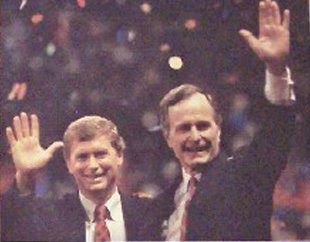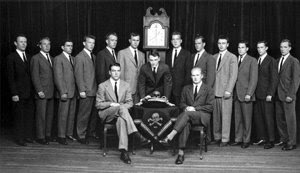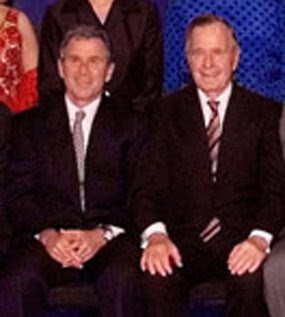Part 2.
George Herbert Walker Bush is strangely remembered as a good President. One reason is obvious: anyone standing next to his son George W. is bound to look good. But another reason is the forgiveness we offer over time to celebrities, drunks and Presidents of the United States. Nixon, for instance, went from utter disgrace to a reputation of "good at foreign policy" or "he just got caught doing what they all do." Jimmy Carter, the everyman's candidate in '76, but repudiated four years later by a 10 to 1 electoral vote spread, is now revered as an American moral example. Another reason, as I wrote earlier, is that worshipful biographies like Austin Hoyt's from The American Experience: The Presidents give Bush an uncritical free pass. His life becomes exemplary in this program, a man whose vision and values heroically tussle with the uncouth realities of an unenlightened world. In the end, he's a guy like you and me, only better. Obviously—he could not possily have become President otherwise.
Another reason, as I wrote earlier, is that worshipful biographies like Austin Hoyt's from The American Experience: The Presidents give Bush an uncritical free pass. His life becomes exemplary in this program, a man whose vision and values heroically tussle with the uncouth realities of an unenlightened world. In the end, he's a guy like you and me, only better. Obviously—he could not possily have become President otherwise.
The problem with such a shallow portrait, in Nixon's case, is that the destructiveness of his years in office can be sidestepped. Fortunately, there is enough in the public record to keep such a whitewash at bay: Nixon was a venal man whose ambitions were unsatisfied even as Leader of the Free World. It's safe to say that Nixon, even had he wiped away all opposition, would still have been unsatisfied. For a guy like Carter, a rhapsodic biography as Bush got on The American Experience would emphasize his high character, but probably overlook his inability to organize an effective executive team and act, an unfortunate side effect of moral nobility.
There are two troubles, then, with Austin Hoyt's hagiography passing as portrait. First, it glosses over Bush's weaknesses as President; second, it gives him an aura of goodness that he simply does not have. He was a wholly deficient President, dismissed like Carter after a failed term. And he is a man who gleefully bathes in the blood of innocents, and has throughout his grownup life. Bush came to the Presidency after a sterling career of appointments. He was elected to Congress in the early 60s as a moderate Republican—meaning, in those years, business friendly, spend a little on infrastructure and resist Civil Rights at all costs. To his credit, Bush challenged his constituency when he voted for open housing; he turned a livid public meeting in his Texas district completely around by appealing to their sense of fairness and modernity, no small feat in the Jim Crow South. Nevertheless, his Presidency was won in 1988 by appealing to the very same intrinsic racism he poetically waved away in the 1960s. His "Willie Horton" ad continued the scurrilous tradition of coding racism within capaign messages. Plainly, Bush's plea for racial equanimity 20 years earlier was not sincere. If it was, that basic decency was trashed in 1988.
Bush came to the Presidency after a sterling career of appointments. He was elected to Congress in the early 60s as a moderate Republican—meaning, in those years, business friendly, spend a little on infrastructure and resist Civil Rights at all costs. To his credit, Bush challenged his constituency when he voted for open housing; he turned a livid public meeting in his Texas district completely around by appealing to their sense of fairness and modernity, no small feat in the Jim Crow South. Nevertheless, his Presidency was won in 1988 by appealing to the very same intrinsic racism he poetically waved away in the 1960s. His "Willie Horton" ad continued the scurrilous tradition of coding racism within capaign messages. Plainly, Bush's plea for racial equanimity 20 years earlier was not sincere. If it was, that basic decency was trashed in 1988.
In 1970, Bush gambled away a secure House seat to run for the Senate at Nixon's urging, and as Nixon's man. He lost, but was made Ambassador to the United nations, then Chairman of the RNC (responsible for fundraising and getting others elected). When one juxtaposes his devotion to Nixon in one circumstance, and to Johnson in the Civil Rights cause, one wonders about Bush's predilection for pleasing men in power. During Gerald Ford's 15 minutes in office, Bush was sent to China, then headed the CIA while a Senate investigation punished it for spying on Americans. Bush's first-hand experience as Director probably helped his descendants reinvigorate illegal spying on domestic targets.
When in the 1980 Republican primaries it became clear that Ronald Reagan would be the party's champion, Bush as Reagan's loudest critic became his running mate instead and served Reagan with devotion for the next eight years. If for position or security, or because of his penchant for serving Presidents, Bush was continuing to get as close to the top as he could. This had served Gerald Ford well: it could serve an observant Bush in turn.
As Commander-in-Chief, Bush rounded up a coalition of world partners to turn back the "naked aggression" of Saddam Hussein's Kuwait invasion. Conversely, after young activists in Tiananman Square had demanded democratic reforms, embraced an American model of government and even erected a statue of liberty in homage to ours, they were steamrolled in the middle of the night by a totalitarian Chinese government.
Bush's response was total silence—not a word of acknowledgement of the movement, nor of regret over the loss of life. As a former (momentary) envoy to China, Bush insisted that allowing the murder of an organic democracy movement in a totalitarian state was the best response for all concerned. Within weeks, Bush family operative Brent Scowcroft was sent to Beijing to toast fascists in the name of the American people.
The tally: On one hand, a moralised world response to a small-scale economic skirmish; on the other hand, a secret and supportive response to the immoral, wanton murder of people begging to ally with our ideology and traditions. More simply, oil tussle expanded to world event; tectonic shift in human history averted. This in brief is the Presidency of George Herbert Waker Bush. But the life in brief of George Herbert Waker Bush is more...well, ordinary, thus more purely evil. The "banality of evil" thesis is that great evils are not generally executed by sociopaths, but by regular people who accept certain basic truths and do horrible things with the view that their actions are normal. Germans in the Nazi era, for instance, went along with atrocities because they were simply following orders. This thesis works aptly in Bush's case, and is supported by Hoyt's mash note to him in The American Experience. Bush was born an aristocrat and therefore above the law just enough, because laws don't exist to limit aristocrats: laws exist in the main to protect aristocrats from ordinary folks. When and if ordinary folks attain aristocracy, they too will enjoy immunity from limitation. So in essence, aristocrats like Bush have no legal restraints on them, except those agreed upon amongst themselves.
But the life in brief of George Herbert Waker Bush is more...well, ordinary, thus more purely evil. The "banality of evil" thesis is that great evils are not generally executed by sociopaths, but by regular people who accept certain basic truths and do horrible things with the view that their actions are normal. Germans in the Nazi era, for instance, went along with atrocities because they were simply following orders. This thesis works aptly in Bush's case, and is supported by Hoyt's mash note to him in The American Experience. Bush was born an aristocrat and therefore above the law just enough, because laws don't exist to limit aristocrats: laws exist in the main to protect aristocrats from ordinary folks. When and if ordinary folks attain aristocracy, they too will enjoy immunity from limitation. So in essence, aristocrats like Bush have no legal restraints on them, except those agreed upon amongst themselves.
Now to be fair, spending one's life in such a protective zone as this might preclude understanding it as unequal, as privileged. But all these cats do go to good schools and get classical educations, where the great questions and concepts of the world are studied. They know what they're doing. So in this entitled sphere, being better than you is simply how it is when you wake up each day as Bush. In this sphere, then, it is not cynical to appeal to the patriotism and racism of the masses because these are simply fuels that power voting behaviors. What ordinary people do and think is simply the landscape in which Bushes work through their lives, activate their higher calling. Using Willie Horton ads, or emphasizing oil wars over deomocracy movements is the means of doing business. Advancing the interests of the Bush family is automatically in the best interests of the United States, because, well, they're Bushes and that's that.
In this sphere, then, it is not cynical to appeal to the patriotism and racism of the masses because these are simply fuels that power voting behaviors. What ordinary people do and think is simply the landscape in which Bushes work through their lives, activate their higher calling. Using Willie Horton ads, or emphasizing oil wars over deomocracy movements is the means of doing business. Advancing the interests of the Bush family is automatically in the best interests of the United States, because, well, they're Bushes and that's that.
There's your banality of evil—just doing business. This is why George Herbert Walker Bush has no compunction about allowing his son to become President of the United States, even while it's clear that the son is retarded. Because even as that son destroys the known world, there is world enough left for Bushes and their kin to inhabit. Comfortably, too.
Bush was an ineffectual President because he had too little talent. He is an historical monster because he is unable to see the cruelty and irresponsibility in standing by while a fool has dismantled America. Bush could not have been a good President, even if he were a good person, and he cannot be a great person because he was President. He does not understand the humanity in people he sees as a lesser species, really, whether through his upbringing or through some other callousness. He has allowed the greatest tragedy in modern history, the Presidency of George W. Bush, by not ably fathering son or country.  There is nobility in a father sacrificing the world for his child. But that nobility comes from recognizing the consequences and taking the punishment. George W. Bush became President because his father ignored the obvious consequences of his son's incapacities. Likely seeing the world as belonging to the child, George Herbert Walker Bush demonstrated his utter disregard for basic citizenship. He has taken no punishment—indeed, pap like Hoyt's veers in the opposite direction. It's probable that Bush's eulogy, like Gerald Ford's, will salute an exemplary life thanks to efforts like Hoyt's.
There is nobility in a father sacrificing the world for his child. But that nobility comes from recognizing the consequences and taking the punishment. George W. Bush became President because his father ignored the obvious consequences of his son's incapacities. Likely seeing the world as belonging to the child, George Herbert Walker Bush demonstrated his utter disregard for basic citizenship. He has taken no punishment—indeed, pap like Hoyt's veers in the opposite direction. It's probable that Bush's eulogy, like Gerald Ford's, will salute an exemplary life thanks to efforts like Hoyt's.
When so many fathers have sacrificed their sons for the country, George Herbert Walker Bush sacrificed the country for an idiot son. If a statesman, as Bush has styled himself, there is no greater crime.
August 6, 2008
Bush on The American Experience
Labels:
American Experience,
Austin Hoyt,
Bush crimes,
Bush family,
Bush worst,
Carter,
Ivy League,
Nixon,
privilege
Subscribe to:
Post Comments (Atom)
No comments:
Post a Comment